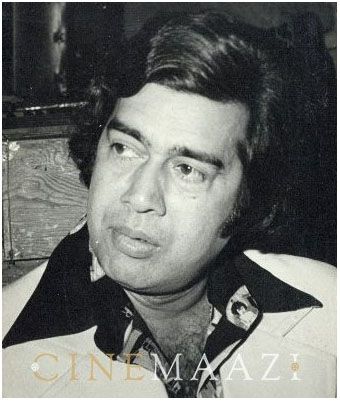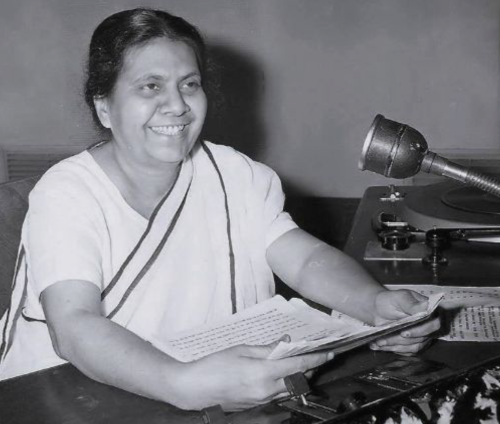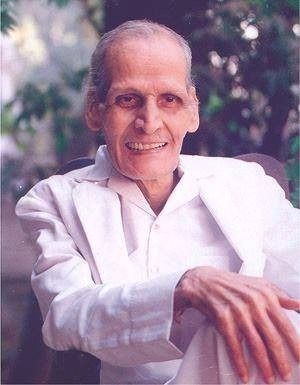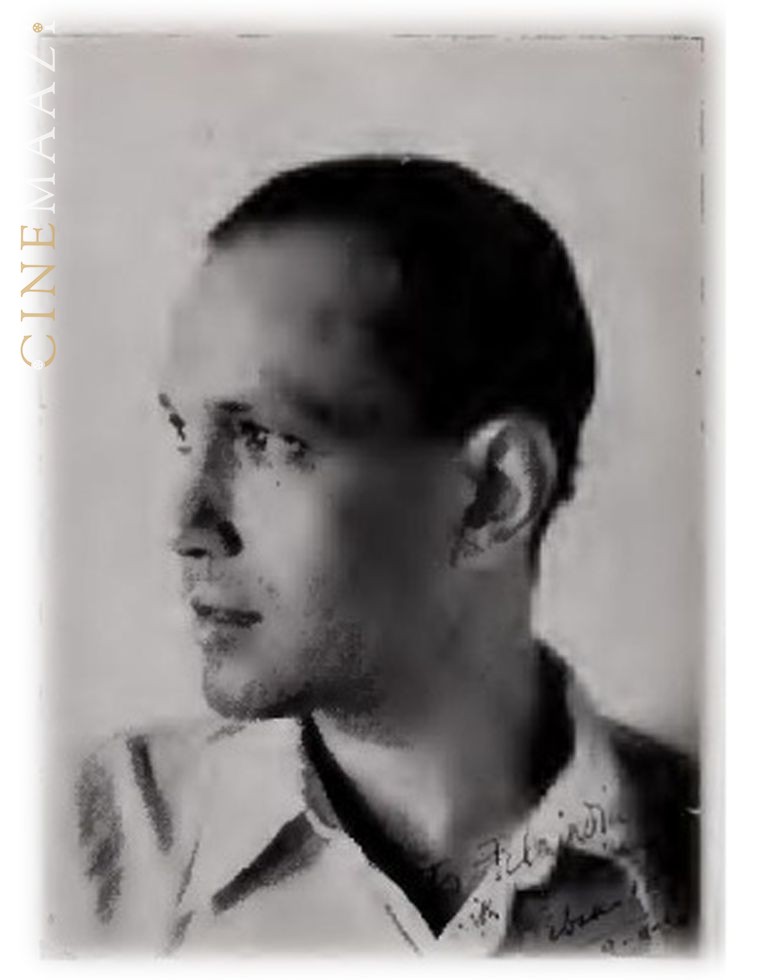"Call it mysticim, Call It Inspired Poetry, I Call It Hocus-Pocus!"
Devaki Bose is not a film director. He is a tradition. He is a legend. He is a menace. He is a menace all the more because he is a genius. Indeed, he is worse than that. He is a poet.
I have told the truth and nothing but the truth. So help me God.
Devaki Bose is not a film director. He is a tradition. He is a legend. He is a menace. He is a menace all the more because he is a genius. Indeed, he is worse than that. He is a poet.
From Kumbakonam to Kashmir, from Karachi to Rangoon, I can visualize thousands of young men and. of course, young women, too! - gnashing their teeth as they read the above lines. If only they could lay their hands on me they would like to tear me to pieces.I know the type. He is mostly to be found in colleges and universities. He generally begins the day by reading Tagore or Radhakrishnan and ends it by seeing a Devaki Bose picture for the umpteenth time. He says he is a patriot but actually he is an idolater worshipping the "Glory That Was Ind." He would prefer to dream about the alleged golden past of India than to join those who are fighting to secure a better future for their country. He struts about in silk kurta and spotless dhotie and thinks he is a great Desh-bhakt but ask him to put on a greasy blue over-all and work in a factory and he will say something about the vulgarity of the industrial civilization. He is the sort of man who finds beauty in any dirty pile of stones if only it is a thousand years old but will condemn a fine hygienic building simply because it is something new. Everything that is vague and misty and smells of the past he adores; everything that is definite, real and modern he regards as cheap and vulgar!
Everything that is vague and misty and smells of the past he adores; everything that is definite, real and modern he regards as cheap and vulgar!
I know the type because many of my friends - indeed an alarmingly large section of the educated Indians - belong to it. To analyse the origin and growth of this species of past - worshippers is a historical task. Briefly, it may be traced back to the inferiority complex produced by foreign domination and the consequent desire to take refuge in the rosy visions of ancient India. Escapism manifests itself either in romanticism or in glorification of the past. The latter is the especial province of Devaki Bose and his fans.FROM "SHADOWS OF DEATH" TO -
The first film that Devaki Bose directed was called "Shadows of Death". It has haunted him ever since.
"In the hoary days of India's glorious past, centuries and centuries ago..." That is how the story of "Puran Bhakt" began. Devaki Bose is still telling the same old grandma's yam.
Make a list of all successful Devaki Bose pictures - "Puran Bhakt", "Seeta", "Raj Rani Meera", "Vidyapati" - and you find the same glorious past being glorified all over again.
That by itself is not such a social crime. I believe that even the story of Adam and Eve can be given social significance and a progressive slant if it is judiciously dramatized. The past is of value only when it can help us to understand and interpret contemporary life. Prabhat make their mythologicals and fantasies instinct with progressive social purpose inspite of miracles and magic. "Amrit Manthan" and "Beyond The Horizon" were eloquent denunciations of religious tyranny and the hypocrisy of priestcraft; "Tukaram" was so great not because he flew away on the back of a bird but because he gave away the last sugar-cane to the neighbour's child rather than to his own, because he defied high-caste orthodoxy to claim every man's right to study the scriptures, because he and his wife worked and lived like any other peasant family; "Gopal Krishna", the eternal boy, pitted himself against the might of a tyrant and "Dnyaneshwar" found the simple masses more spiritually elevated than the highborn priests. Each of these stories could have been filmed merely as spectacular sagas, glorifying the material and spiritual greatness of ancient India, but they were made purposeful and progressive by treating the subjects realistically and properly emphasizing the social and economic background.
Each of these stories could have been filmed merely as spectacular sagas, glorifying the material and spiritual greatness of ancient India, but they were made purposeful and progressive by treating the subjects realistically and properly emphasizing the social and economic background.
"The Hunchback of Notre Dame" was filmed many years ago on an ambitious scale but the emphasis in that picture was throughout on Lon Chaney's hideous make-up and on the spectacular scenes. The same story when made by William Dieterle gained in contemporary social significance and the mighty sweep of a people in revolt against injustice and oppression gave a definite meaning and purpose to the tragedy of the ugly Hunchback.PAST MASTER IN THE PAST
Devaki Bose would have done an incalculable service to the cause of progressive films if he had similarly given a social significance to his pictures. But then he is interested in the past and not in progress. To him the glorification of ancient legends is an end in itself, not a means to the better reorganization of the present-day human society.
"Chandidas", which Devaki Bose produced in Bengali passively accepted the inequalities and inequities of the social system. The highborn poet and the low caste washer woman sang a few songs and parted, accepting the verdict of fate. And "Puran Bhakt" took the "long unending road of Ahimsa and renunciation" leaving his wife and family behind. As for "Vidyapati", it still remains a mystery why the Queen put greater trust in the words of a patently villainous Minister than in the repeated assurances of her husband and commited suicide directly causing her already ailing husband's death. I have seldom seen two more useless deaths.
To him the glorification of ancient legends is an end in itself, not a means to the better reorganization of the present-day human society. "Chandidas", which Devaki Bose produced in Bengali passively accepted the inequalities and inequities of the social system.
Now I am certain that few of Devaki Bose fans believe in such things. I know people who went mad over "Puran Bhakt" but if it came to a renuciation of the world they would not be able to give up smoking cigarettes much less abstain from drinking wine. I do not blame them. Lost in a world of rapidly changing ethical values, unable to grasp the true significance of social and economic phenomena and bewildered by the paradoxes of our hybrid present day culture, they are easily impressed by metaphysical abstractions, misty idealism and high flown talk of Bhakti and renunciation. It is the same phenomenon that makes millionaire American women ready victims of the glib tongue of swamis and spiritualists.DEVAKI'S FANATICAL CULT
The secret of Devaki Bose's success thus lies not in his directorial competence or the technical quality of his picture but in the popular acceptance of the pseudo-mystical and romanticist melodramas he caters to the public. You don't believe it, of course! Then, why is it, that Devaki Bose is remembered for his "Puran Bhakt", "Seeta" and "Raj Rani Meera", and not for a longer list of flops like "After The Earthquake", "Life Is A Stage", "Sonehra Sansar" and "Sapera"? Think about it and see if you arrive at the same conclusion as I have.
The trouble is that the Devaki Bose cult is so fanatical that he has come to assume an almost religious and sacrosanct position. Thus very few of them will be able to dispassionately study and analyse the work of their favourite director. The dozens of letters that came to me and the hundreds that came to the Editor of "Filmindia" after the publication of my last article on "The Only Three Great Directors of India!" are fully representative of this widespread sect.
Among these piles of abusive epistles, angry denunciations and indignant protests, there was one suggestion, the unconscious humour of which struck me as rather too cute. I was asked to write an article on "Devaki Kumar Bose Made Easy." Yes, he does need a lot of explaining to be intelligible to the plain and simple folks!
WHAT I THINK OF HIM
Speaking strictly for myself, I would like to briefly put on record my evaluation of Devaki Bose as a director. Here it goes.
I was one of the few people, who thought "Seeta" to be superb. I would still place it among the six best Indian films ever produced.
I was one of the few people, who thought "Seeta" to be superb. I would still place it among the six best Indian films ever produced. "Puran Bhakt" I did not like so much though, for that time, it was a great advance on the general technique of picture. To Devaki Bose goes the credit of rescuing the Indian film from the crudities prevalent at that time. Being a man of education and aesthetic taste he considerably helped the growing refinement of the Indian films. His ability to interpret the legends of "Puran Bhakt", "Seeta" and “Meera" in a soaring manner bordered on sheer genius.
But - and here comes the snag - while his flair (call it genius) for recreating the atmosphere of faded splendour and spiritual grandeur has remained with him, his technical skill as a motion picture director has not matured with the passage of time.
But - and here comes the snag - while his flair (call it genius) for recreating the atmosphere of faded splendour and spiritual grandeur has remained with him, his technical skill as a motion picture director has not matured with the passage of time. I dare to assert that, technically, "Vidyapati" was not a wee bit of improvement upon "Seeta", which, of course, does not bring down Devaki Bose to the level of the average Indian director who will take another twenty-five years to make a picture half as good as "Seeta," But surely a man whose technical skill remained static for five years cannot be classed along the topmost three.If Devaki Bose fails, it is by his own standards. I would not waste my time and the pages of "Filmindia" on a third rate director. If I deplore his present stagnation it is because of what he might have been, if only he had cared to study and follow the progressive trends in filmcraft instead of continuing to exploit the reputation he had once made for himself.
COMEDY OR HOODOO HOCUS
Let me give but one example of the antiquated notions of dramatic construction still followed by Devaki Bose. Even the greatest admirer of Devaki Bose will admit that comedy is his weak point, that every time he wants to put a humorous situation in his picture it degenerates into the crudest banal episode. But more important to watch, is how like the old stage playwrights, Devaki Bose clumsily introduces the comedy element in his pictures, something brought in from without instead of it being inherent and arising from within the theme pattern. A gem of a picture like "Seeta" was vulgarized at places by the presence of the two slapstick comedians, Mota and Dubla.
This Laurel-Hardy type of clowns reappeared in "Life Is A Stage" as "Fat Tummy" and "Thin Leg" (both specifically mentioned as "Comedians" in the cast!) and, finally, we saw them in "Vidyapati" as Vidushak (Nemo) and Pitambar (Kedar Sharma). I won't be surprised to see them again in "Nartaki."
"Sonehra Sansar" began the "Merry Gang" menace and after vulgarly lampooning the life of the educated unemployed in "Sonehra Sansar", they reappeared in "Sapera", waving tree branches and jumping and dancing to music that suspiciously sounded like the hoodoo hocus of the African Jungle pictures of the Tarzan variety. It is still a mystery how a man of undoubted aesthetic taste like Devaki Bose can tolerate such nonsense in his pictures.
The only reason that can suggest itself to me is his continued adherence to the old dramatic technique which is again illustrated by the presence of the same blind singer right from "Seeta" to "Sapera" in every picture!
FAR FROM REALISM
Now the point I wish to make is this: that in spectacular costume dramas, overflowing with devotional and romanticist sentiments, such lapses are easily glossed over. Everything is done and said with an extra flourish and no one expects realism. It is in pictures with a modern background, however, that technical excellence - in sound and photography as well as in scenario construction - counts and the slightest crudity is noticed. Hence the seeming disparity between the standards of his 'social' pictures like "After The Earthquake" and his 'costume' pictures like "Vidyapati."
It is in pictures with a modern background, however, that technical excellence - in sound and photography as well as in scenario construction - counts and the slightest crudity is noticed. Hence the seeming disparity between the standards of his 'social' pictures like "After The Earthquake" and his 'costume' pictures like "Vidyapati."
And if anything more were needed to conclusively prove Devaki Bose's lack of grasp on modern cinema technique it was provided by "Sapera." Here was an out-door subject full of possibilities for being turned into a first rate documentary. But what do we get? A few chalky exteriors and studio-made background! The landscape, the very earth, that is the background of the snake charmers' life was nowhere seen. Contrast it with the authentic rural shots of "Woman" and you know what can be done in synthesize atmospheric effects as an integral part of the dramatic pattern. Here was a subject that demanded hundred per cent realism and instead we got that jumbo jumbo dance of "Merry Gang"!MEANT FOR EMOTIONAL ESCAPISM
Devaki Bose's persistent failure to make purposeful modern films is patent. And so, after every such 'flop,' he reverts to those tales of bygone days, of Gods and Goddesses of Kings and Princesses and romantic poets. Being essentially a poet and a conservative, he will make these pictures with no desire to put any progressive ideals into them. And being a genius he will breathe into them a certain emotional appeal and charm that will be like a soothing balm to the frustrated souls of the romantic youths of the country to whom his pictures have come to mean one more escapist formula for emotional satisfaction. Call it mysticism, call it inspired poetry, I call it hocus-pocus.
And in a country already suffering from an excess of religion, superstition, poetry, mysticism and fatalism, anyone whether he is a Tagore or a Jinnah or a Devaki Bose - who radiates these reactionary influences is a menace.
This is a reproduction of the original published in Film India, August, 1940.
71 views
Tags
About the Author







.jpg)


